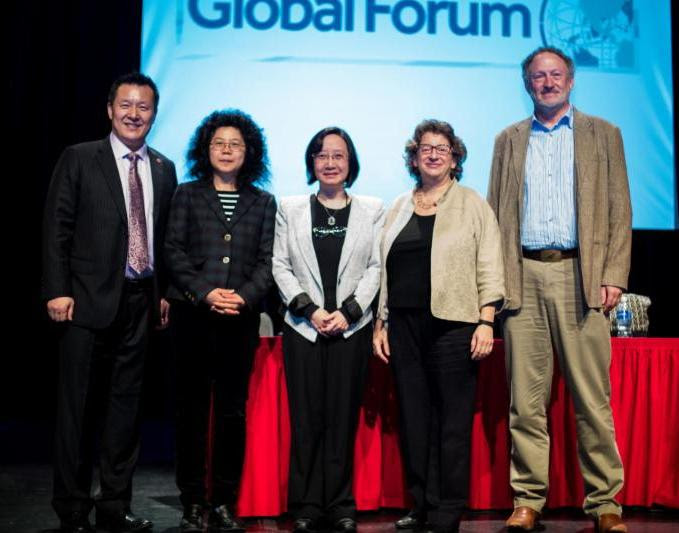|
Global Forum Explores Intercultural Communication
In collaboration with the Center for Multilingual and Intercultural Communication (MIC), the Office of Global Affairs presented its second Global Forum on March 1, focusing on intercultural communications. Picture: Global Forum Panelists Drs. Jun Liu, Wei Zhu, Agnes He, Nancy Goroff and Michael Frohman Even though Stony Brook University is located in Long Island, New York, we are, in a very literal sense, both globally constituted and globally oriented. Our mission and our reach truly extend “far beyond”. Intercultural communication embodies a set of practices and skills which enable us to develop multicultural awareness and global civics. Each day and in every corner of the campus, many Stony Brook stories of globalization and intercultural communication are taking place. By nature, the university setting tends to focus on academics, however extracurricular engagement is equally important in developing these skills. Keynote speaker Dr. Agnes He (Prof. and Chair, Asian & Asian American Studies) along with panelists Dr. Nancy Goroff (Prof. and Chair, Chemistry), Dr. Michael Frohman (Distinguished Prof. and Chair, Pharmacological Sciences), Dr. Wei Zhu (Prof. and Deputy Chair, Applied Math & Statistics), and Dr. Georges Fouron (Prof., Africana Studies), and moderator Dr. Jun Liu (Vice Provost, Global Affairs) explored this theme, offering personal anecdotes and advice to the audience to help enhance their intercultural communication skills. Dr. He: Students from all backgrounds are encouraged to engage in campus life fully and fearlessly and to maximize their experience at Stony Brook University to achieve personal growth and transformation. Dr. Goroff: It is incredibly important to take proactive steps to build bridges, not just by talking to people from diverse cultural backgrounds, but also listening to them and engaging in their responses. Dr. Frohman: What we value tremendously in biomedical science is creativity and the ability to approach problems from multiple directions with an open mind, the ability to imagine and consider solutions that go beyond one’s formal training. Intercultural communication is invaluable in that people from different cultures bring with them different ways of approaching problems, and learning to listen to other ways of thinking about problems creates greater mental flexibility. This type of communication works both ways – students from foreign countries will get the most out of their educational training in the US if they seek to interact with Americans and other international students, and American students in turn have much that they can learn from international students. Dr. Zhu: Be open-minded and receptive. People from different cultures have more in common than not. Help each other and together we will make our Stony Brook community and those far beyond, better. Dr. Fouron: Remember that America represents intercommunication among nations and bringing together different cultures and perspectives. A video of the Global Forum is on the Global Affairs website. |

